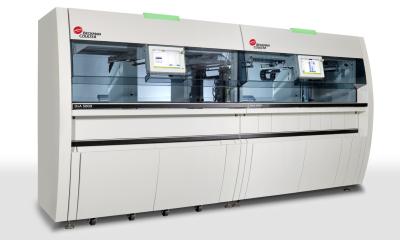Sponsored • Pediatric laboratory medicine
The Orphan
Pediatric laboratory medicine plays a minor role in the large field of laboratory medicine. This may be due to the low incidence of rare diseases, which are a major task of pediatric medicine, but also to the small number of pediatric samples in routine laboratory medicine overall. Since most diagnostic laboratories do receive pediatric samples now and then, it is essential that there are primary sources of information and networks to answer questions arising around pediatric laboratory medicine.
Report: Martin Hersberger

The challenge in pediatric laboratory medicine starts in pre-analytics: the small blood collection tubes with capillary blood samples are not compatible with automated tube handling of pre-analytical solutions in high-throughput core laboratories. In view of the fact that pre-term neonates can have a total blood volume of less than 80 ml, it is understandable that neonatologists are reluctant to draw more blood than absolutely necessary. Thus, the pediatric laboratory has to collect manually even the last drop of plasma for diagnostic purposes to prevent a transfusion of erythrocytes.
The main challenge in pediatric laboratory medicine are inborn diseases which individually are rare but in their multitude lead to a large number of pediatric patients. The wide field of inborn errors of metabolism, inborn endocrine disorders, and inborn immunological defects mainly pertains to the pediatric population. For these diseases pediatric laboratory medicine offers many analyses to support diagnosis and follow-up. For example, pediatric laboratories offer several targeted metabolomic profile analyses which may lead to the investigation of a specific enzyme defect followed by genetic confirmation of the rare monogenic disease. While most pediatric laboratories offer targeted metabolomic profile analysis, enzymatic and genetic analysis are available only in specialized centers for inborn errors of metabolism that have the necessary diagnostic experience for a limited number of diseases. Communication between the pediatric laboratories and the specialized centers enables the diagnosis of many rare or orphan diseases. Networking support is provided by orphanet (www.orpha.net), an initiative that allows searching for orphan diseases and directly lists the specialized pediatric laboratories offering the appropriate diagnostic procedures. However, the current list of orphan diseases is incomplete and novel orphan diseases are discovered every week. Thus, pediatric laboratories need to adapt their metabolomic profile analyses constantly in order to cover all newly discovered diseases. It is reasonable to assume that these metabolomic profile analyses will become crucial also for adult patients since life expectancy of pediatric patients with inborn errors of metabolism is increasing and more of these patients will reach adulthood due to new drugs and better treatment in general.
Even routine pediatric laboratory medicine can be challenging because children are not just small adults but have a distinct physiology that moreover changes during development from neonate to young adult. This is particularly obvious in analytes such as alkaline phosphatase during growth and in sex hormones during puberty, which require interpretation and reference intervals. Due to the rapid changes of reference intervals during development, pediatric laboratories would prefer implementing continuous reference intervals rather than displaying the categorical age groups that most laboratory information systems support today.

In order to be able to develop continuous reference intervals, we need solid reference data over the entire developmental period from the neonate to the young adult. While these data were not available in the past, several working groups within the IFCC in Northern Europe and in Canada have contributed recently to the establishment of solid reference intervals in the pediatric and adolescent age range. For example, the large children and adolescent health study (Kinder- und Jugend-Gesundheitsstudie www.kiggs.de) in Germany established reference intervals for routine clinical chemistry and hematology; in addition, the Canadian CALIPER study (www.caliperdatabase.com) provided reference intervals for endocrinology. These studies now allow the diagnosis of orphan diseases detected with routine diagnostics such as hypophosphatasia or hypoalphalipoproteinemia, which both need lower reference levels for alkaline phosphatase and HDL cholesterol, respectively. These initiatives for the establishment of solid reference intervals are supported and coordinated by the Task Force for Pediatric Laboratory Medicine of the IFCC. This Task Force also organizes the triannual "International Congress on Pediatric Laboratory Medicine" (ICPLM) as a satellite meeting of the IFCC WorldLab. The next ICPLM will take place on 20 to 22 October 2017 in Durban, South Africa.
Congresses such as ICPLM allow networking between professionals in pediatric laboratories and provide clinical and scientific further education for these professionals. In addition, these events offer laboratory professionals who handle pediatric samples now and then insights into pediatric laboratory medicine and serve as a communication forum with professionals in pediatric laboratory medicine.
25.07.2016





